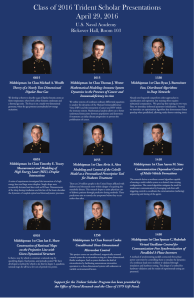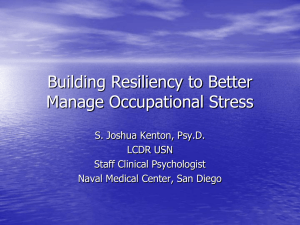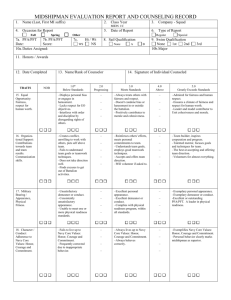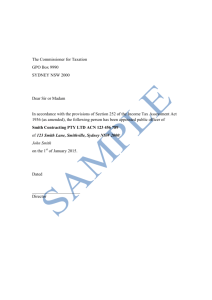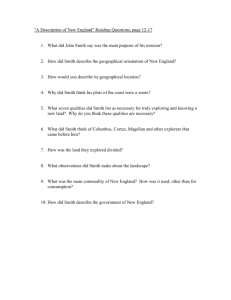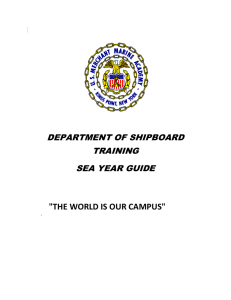NROTC OSC ILT Part1 UPDATED 10 2011
advertisement
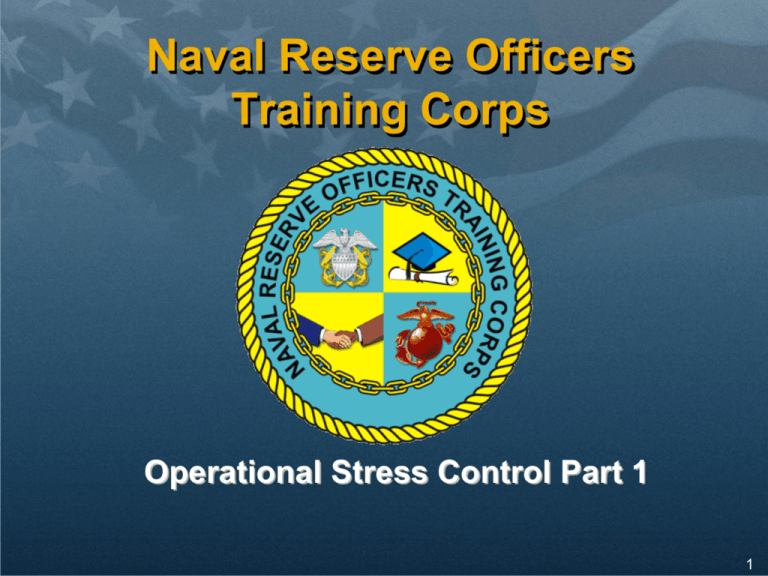
Naval Reserve Officers Training Corps Operational Stress Control Part 1 1 Objectives • • • • • Define stress. Define terms associated with stress. Identify the causes of stress. Explain the Stress Continuum Model. Recognize common reactions in self and others to operational stress as identified in the Stress Continuum Model. • Apply Stress Continuum Model in different examples. 2 Definition of Stress Dictionary’s: Stress is a mental, emotional or physical strain or tension Navy’s Definition: The process by which we respond to challenges to the body or mind. 3 Stress • Stress is something everyone experiences daily, and is. – A normal part of life – Any demand on the mind or body – A natural reaction to everyday challenges • Stress is a double-edged sword. It can: – Provide an opportunity for growth – Wear you down 4 Adapting to Stress • Leaders and Shipmates can help Sailors and Marines adapt to stress by providing: – Tough realistic training – Knowledge, skills, and attitudes necessary to help build resilience to stress related problems 5 Resilience Resilience is the ability to recover from, adjust to, and bounce back from misfortune or change. 6 Causes of Operational Stress 7 Causes of Stress – Internal • Internal – Emotions – Decisions – Physical – Thoughts 8 Causes of Stress – External • External – Relationship – Social – Environment – Work – Spirituality 9 Stress Continuum Model 10 Stress Continuum Model 11 11 Healthy: The Ready Green Zone READY Sailors / Marines • Calm and steady • Confident and competent • Adequate rest • Good sense of humor 12 Healthy: The Ready Green Zone READY Commands • Highly trained and qualified • Keep morale high • Maintain equipment properly • Pay close attention to detail 13 Healthy: The Ready Green Zone READY Family • Family members feel secure • Good communication between all family members • Home is clean organized home • Siblings and children functioning well at home and in school • Families interacting well 14 Healthy: “Staying Green” (Ready) STAYING READY • Stay fit; eat right • Get adequate rest • Push to your personal best in training • Use alcohol in moderation • Know your own limits • Practice personal integrity and Navy Core Values • Resolve conflicts effectively 15 What is a “Stress Reaction”? Temporary, mild physical or mental distress 16 Stress Continuum Model 17 17 Recognizing Stress: The Yellow Reacting Zone REACTING Sailors / Marines • Feeling anxious, irritable • Cutting corners • Grouchy and short-tempered • Difficulty sleeping • Changes in eating patterns 18 Recognizing Stress: The Yellow Reacting Zone REACTING Commands • Decreasing morale • Alcohol related incidents rise • Reduced attention to detail • Minor discipline problems • Deferred maintenance 19 Recognizing Stress: The Yellow Reacting Zone REACTING Families • Families arguing • Children acting out, or having trouble in school • Increased financial difficulties • Reduced intimacy • Increased clutter and disorder 20 The Yellow Reacting Zone WHAT TO DO • Work out regularly, eat right, and stay hydrated. • Attend to your spiritual needs. • Redirect your attention away from the event. • Encourage yourself and others. • Practice breathing and muscle relaxation techniques. 21 Case Study BEFORE Personal Fitness Test • Anxious • Worried AFTER • Calm and steady • Relieved after successfully accomplished your run 22 Stress Continuum Model 23 23 Stress Injury Mechanisms 24 Recognizing Stress Injuries: The Orange Injured Zone INJURED Sailors / Marines • Loss of control • Recurrent vivid nightmares • Attacks of panic or rage • Disruption of moral values • Serious suicidal or homicidal thoughts 25 Recognizing Stress Injuries: The Orange Injured Zone INJURED Commands • Low morale, divided camps • Equipment out of service • Significant discipline problems • Significant alcohol incidents • Multiple drug incidents 26 Recognizing Stress Injuries: The Orange Injured Zone INJURED Families • Feeling of chaos • Constant fighting • Silence/no communication • Verbal or physical abuse • Children have failing grades • Couple experiencing loss of closeness/intimacy 27 The Orange Injured Zone What To Do • Talk with Chain of Command • Seek assistance from chaplains, counselors, and/or medical staff 28 Stress Continuum Model 29 29 Recognizing Stress Illnesses: The Red Ill Zone ILL Sailors / Marines • Post Traumatic Stress Disorder • Anxiety and Panic Disorders • Substance Dependence • Severe Depression • Physical injuries: Stress Impact, TBI, Infections, Addictions 30 Stress Continuum Model The Goal of Navy OSC is to move towards GREEN 31 31 Scenario READY REACTING INJURED ILL (Green) (Yellow) (Orange) (Red) 32 Scenario: Part 1 • Midshipman Smith has finished spring semester finals at the university. • Midshipman Smith is ready for summer cruise. • What zone do you think Midshipman Smith is in? READY (Green) REACTING INJURED (Yellow) (Orange) ILL (Red) 33 Scenario: Part 1 • Midshipman Smith may be in the Green Zone. – Green Zone signs: Calm and steady READY (Green) 34 Scenario: Part 2 • Midshipman Smith has started week 1 of summer cruise and is currently at sea. • Midshipman Smith has just received a Red Cross message that Grandma Smith has suffered a stroke. • Midshipman Smith is anxious and is now cutting corners at summer training. • Since Grandma Smith was not the primary caregiver, Midshipman Smith is unable to go home. • What zone do you think Midshipman Smith is in? READY (Green) REACTING INJURED (Yellow) (Orange) ILL (Red) 35 Scenario: Part 2 • Midshipman Smith is the Yellow Zone. – Yellow Zone signs: Anxious and cutting corners on the job REACTING (Yellow) 36 Scenario: Part 3 • Midshipman Smith is now in week 2 of summer cruise. • Midshipman Smith has just received a second Red Cross message stating that Grandma has died. • Midshipman Smith is unable to sleep, is having vivid nightmares, and is feeling guilty about not seeing Grandma. Midshipman Smith will not be able to attend the funeral. • What zone do you think Midshipman Smith is in? READY (Green) REACTING INJURED (Yellow) (Orange) ILL (Red) 37 Scenario: Part 3 • Midshipman Smith is the Orange Zone. – Orange Zone signs: Unable to sleep, having vivid nightmares, and feelings of guilt INJURED (Orange) 38 Scenario Summary This scenario showed how an individual can rapidly move from the Green toThe Goal of the Yellow Zone and end up in the Orange Zone. Navy OSC is to move towards GREEN 39 Summary Now that you have completed part one of the NROTC – OSC Module, you should be able to: • • • • • Define stress. Define terms associated with stress. Identify the causes of stress. Explain the Stress Continuum Model. Recognize common reactions in self and others to operational stress as identified in the Stress Continuum Model. • Apply Stress Continuum Model in different examples. 40
